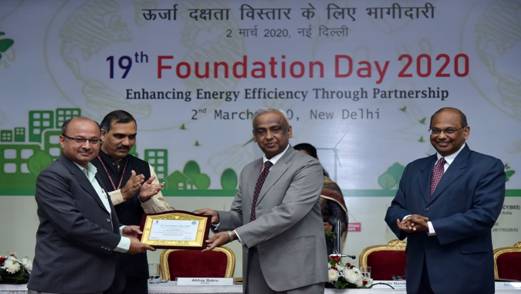Ministry of Power
BEE launches star rating programme for Deep Freezer and Light Commercial Air Conditioners (LCAC) on its foundation day
Stakeholder Consultation towards developing Energy Efficient India
Star Labeling programme for Deep Freezer and Light Commercial Air Conditioners (LCAC) together are expected to save approx. 9 BU of electricity by 2030
Posted On:
02 MAR 2020 5:23PM by PIB Delhi
To commemorate its 19th foundation day, Bureau of Energy Efficiency (BEE), Ministry of Power, Government of India organized a Stakeholder Consultation here today to develop a vision towards building an energy efficient India. Launching the programme, Shri Sanjeev Nandan Sahai, Secretary (Power) said, “I appreciate the hard work of BEE for contributing towards an energy efficient economy and at the same time, I also expect BEE to come up with more such programs in future. Such interaction would pave a way forward for initiatives to be taken by BEE in the sphere of energy efficiency. Deep freezer and LCAC are major energy guzzlers in commercial space, therefore, it is imperative that these two appliances shall be included in the program to save energy and reduce CO2 emission. With these two products only, a total savings of around 9 Billion units of electricity is expected to be saved for the country by FY 2030.”
While welcoming the stakeholders during the programme, Shri Abhay Bakre, DG BEE, appreciated the support and guidance extended by the partners from public and private sector as well as multilateral agencies in taking forward key BEE programmes/initiatives.
The Star Labeling Programme has been formulated by Bureau of Energy Efficiency, as part of its mandate, under the Energy Conservation Act, 2001. Under this Programme, BEE has covered 24 appliances till date wherein 10 appliances are under mandatory regime. On the occasion of 19th foundation day, BEE has expanded the coverage by including Energy Efficient “Deep Freezers” and “Light Commercial Air Conditioners (LCAC)”. Through launch of these two new appliances under voluntary regime, 26 appliances would now be covered under this programme. During the event, Urja Dakshata Information Tool (UDIT) (www.udit.beeindia.gov.in), a first ever initiative taken by BEE with World Resources Institute (WRI), to facilitate a database on energy efficiency was launched. UDIT is a user-friendly platform that explains the energy efficiency landscape of India across industry, appliances, building, transport, municipal and agriculture sectors. UDIT will also showcase the capacity building and new initiatives taken up by the Government across the sectors in the increase energy efficiency domain.

Stakeholder Consultation towards developing Energy Efficient India
India’s energy sector is set for a transition with recent developmental ambitions of the Government e.g. 175 GW of installed capacity of renewable energy by 2022, 24X7 Power for all, Housing for all by 2022, 100 smart cities mission, promotion of e- mobility, electrification of railway sector, 100% electrification of households, Solarization of agricultural pump sets, and promotion of clean cooking.
Energy Efficiency has the maximum GHG abatement potential of around 51% followed by renewables (32%), biofuels (1%), nuclear (8%), carbon capture and storage (8%) as per the World Energy Outlook (WEO 2010). India can avoid building 300 GW of new power generation up to 2040 with implementation of ambitious energy efficiency policies (IEA – India 2020). Successful implementation of Energy Efficiency Measures contributed to electricity savings of 86.60 BUs i.e. 7.14% of total electricity consumption of the country and emission reduction of 108.28 million tonnes of CO2 during 2017-18. To discuss the way forward, Stakeholders Consultation Workshops were organized on the occasion of 19th foundation day function, which was attended by stakeholders for various segments.
Launch of Star Labeling Program for Deep Freezers and Light Commercial Air Conditioners
The Star Labeling Programme for Deep Freezer has been launched on a voluntary basis and the energy consumption standards will be effective up to 31st December 2021. The program covers hardtop and glass top chest type Deep Freezer of all capacities complying with requirements of IS 302-2-24 for safety and IS 7872 for energy performance.
The performance benchmarks/ energy consumption standards are based on Annual Energy Consumption (kWh/year) of Deep Freezers. The commercial refrigeration sector primarily consists of Deep Freezers and it is poised to multiply 2-fold over the next decade leading to increased electricity demand.
The total organized market size for chest and upright type deep freezer segment for FY 2017-18 was about 5-6 lakh units. The market got more than doubled in last 3 years with a CAGR of 28% and is expected to grow at a higher CAGR. The chest type freezers constitute about 99% of the market share, leaving 1% for the upright type. About 3.72 lakh deep freezer units were imported while remaining are indigenously manufactured.
Through this initiative, it is expected to save around 6.2 Billion Units by FY2030, which is equivalent to Green House Gas (GHG) reduction of 5.3-million-ton of Carbon Dioxide.
The existing BEE star labeling program for Air Conditioners is based on Indian Standard IS 1391 part 1, part 2 and covers AC with cooling capacities upto 10.5kW. In order to cover split ACs beyond the scope of existing BEE star labeling program upto a cooling capacity of 18kW, BEE has prepared a star labeling program for split ACs having cooling capacities in excess of 10.5kW and upto 18.0 kW. This category of Air conditioners is termed as “Light Commercial Air conditioners (LCAC)” primarily due to their application in commercial air conditioning.
The program will be initially launched in voluntary mode from 2ndMarch, 2020 to 31st December, 2021. Thereafter, it will be made mandatory after reviewing the degree of market transformation in this particular segment of appliances.
Through this initiative, it is expected to save around 2.8 Billion Units by FY2030, which is equivalent to Green House Gas (GHG) reduction of 2.4-million-ton Carbon Dioxide.
*****
RCJ/SKP/RT/MI
(Release ID: 1604867)
Visitor Counter : 3251